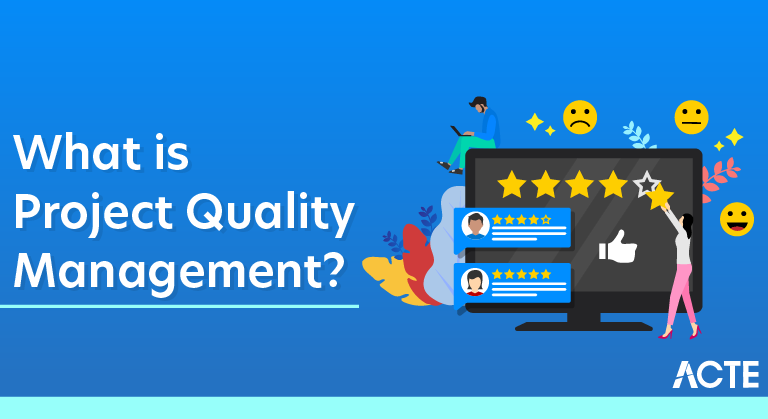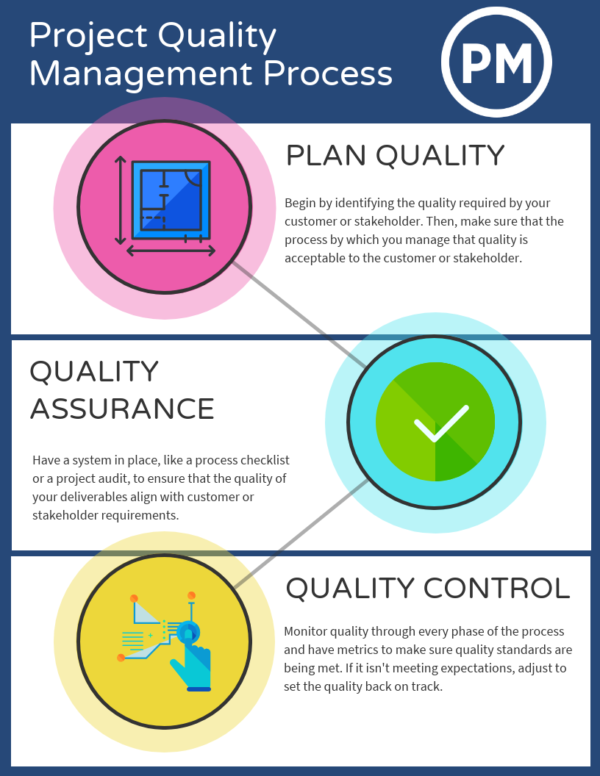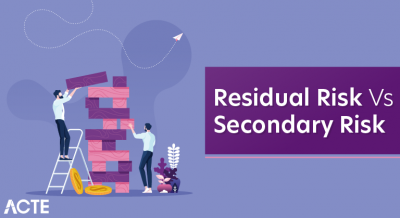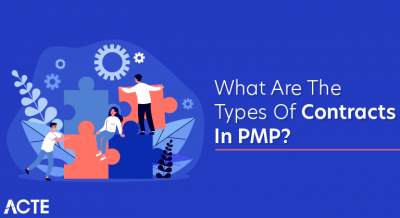
- Project quality management is the process through which quality is managed and maintained throughout a project. While the context may imply that “quality” means “perfection,” in this case, is usually more about ensuring quality consistency throughout a project.
- However, what is exactly meant by “quality” is beholden to what the customer or stakeholder needs from the project, and therefore can be different on a per-project basis.
- Modern quality management and project management are complementary. They both emphasize customer satisfaction and the underlying belief that quality leads to customer satisfaction.
- The main objective in project quality management is making sure that the project meets the needs it was originally created to meet nothing more, nothing less.
- In other words, to ensure quality, you must meet the needs of the stakeholder.
- Meeting or exceeding requirements, however, is not part of project quality management. According to A Guide to the Project Management Body of Knowledge (PMBOK Guide), quality is “the degree to which a set of inherent characteristics fulfill requirements.”
- The project manager and project management team have a special responsibility to balance quality and grade (a category or rank assigned to products or services having the same functional use but different technical characteristics).
- This responsibility ensures quality expectations are met. This means that it might be possible and reasonable to have a quality, low-grade product, but it is never acceptable to have a low-quality product.
- At the beginning of the project, requirements are determined with the stakeholders. These requirements become the foundation for the work of the project. After that, the project manager’s job is to ensure that the work is done with no extras included. Quality is not about giving the customer extras or completing extra work.
- The notion of extras is often based on possibly erroneous perceptions of what you believe the customer wants. These extras add time, possible costs and other impacts to a project but do not always result in increased customer satisfaction.
- The Purpose of Management of Quality The main principle of project quality management is to ensure the project will meet or exceed stakeholder’s needs and expectations.
- The project team must develop a good relationship with key stakeholders, specially the donor and the beneficiaries of the project, to understand what quality means to them.
- One of the causes for poor project evaluations is the project focuses only in meeting the written requirements for the main outputs and ignores other stakeholder needs and expectations for the project. Quality must be viewed on an equal level with scope, schedule and budget.
- If a project donor is not satisfied with the quality of how the project is delivering the outcomes, the project team will need to make adjustments to scope, schedule and budget to satisfy the donor’s needs and expectations.
- To deliver the project scope on time and on budget is not enough, to achieve stakeholder satisfaction the project must develop a good working relationship with all stakeholders and understand their stated or implied needs.
Project quality management consists of three major processes:
- Quality management planning: This involves identifying the quality requirements and standards for the project and product. The goal of the project quality management should be clearly shared with all stakeholders, and appropriate tasks should be delegated to those responsible.
- Quality assurance: This involves auditing the quality requirements and quality control results to ensure appropriate quality standards are used. When standards are not met or goals aren’t achieved, necessary steps and corrective actions should be employed to fix these issues.
- Quality control: This involves monitoring and recording the results of quality activities to assess performance and recommend necessary changes.
The definition of quality is central to understanding these three processes. To be able to define quality, you need to be clear about the meaning of the following terms:
- Validation: assurance that the product meets the agreed-upon needs
- Verification: compliance with requirements
- Precision: repeatable measures in a tight grouping
- Accuracy: closeness of a measure to the true value
- Tolerance: range of acceptable results
The quality management planning process determines the quality standards that are applicable to the project and devises a way to satisfy them. The goal is to create a quality management plan which documents the following:
- The way the team will implement the quality policy
- The way the quality of both the project and the product will be assured during the project
- The resources required to ensure quality
- The additional activities necessary to carry out the quality plan
- Identifying these items might require updates to the project management plan or schedule, which emphasizes the evolving nature of the plan and project documents. The plan, like other components created during the planning phase, is written by the project manager with input from stakeholders. When planning for quality on a project follow the corporate quality policies that are in place.
- If a corporate quality policy does not exist, the project team should create one for the project.
Once you have an idea of the different concepts, the next step is to implement a project quality management plan. To do so, follow these three steps.
<Plan QualityFirst identify the requirements for the quality of the deliverable and how the project needs to be managed. Agree on how this process will be documented and how that information will be delivered.
Will you have regular meetings, emails, etc.?
The plan will include these specifics as well as metrics for measuring the quality while managing the project. This should include a quality checklist to collect and organize the marks you need to hit during the project.

Quality Assurance
Quality assurance, according to the American Society for Quality (ASQ) is “the planned and systemic activities implemented in a quality system so that quality requirements for a product or service will be fulfilled.”
Use quality assurance to make sure your processes are in fact working towards making the project deliverables meet quality requirements. Two ways to accomplish this is by using a process checklist and a project audit.
- Every process needs a policeman, so to speak, to make sure that the rules are being following and that the expected quality is being met.
- Some ways to ensure that the required quality of the deliverables is being achieved is through peer reviews and testing.
- It’s essential to check the quality of the deliverables during the project management process in order to adjust the deliverables if they’re not meeting the standards that have been set.
- This can be done at the end of the project, but it’s not as efficient to redo rather than to readjust.





